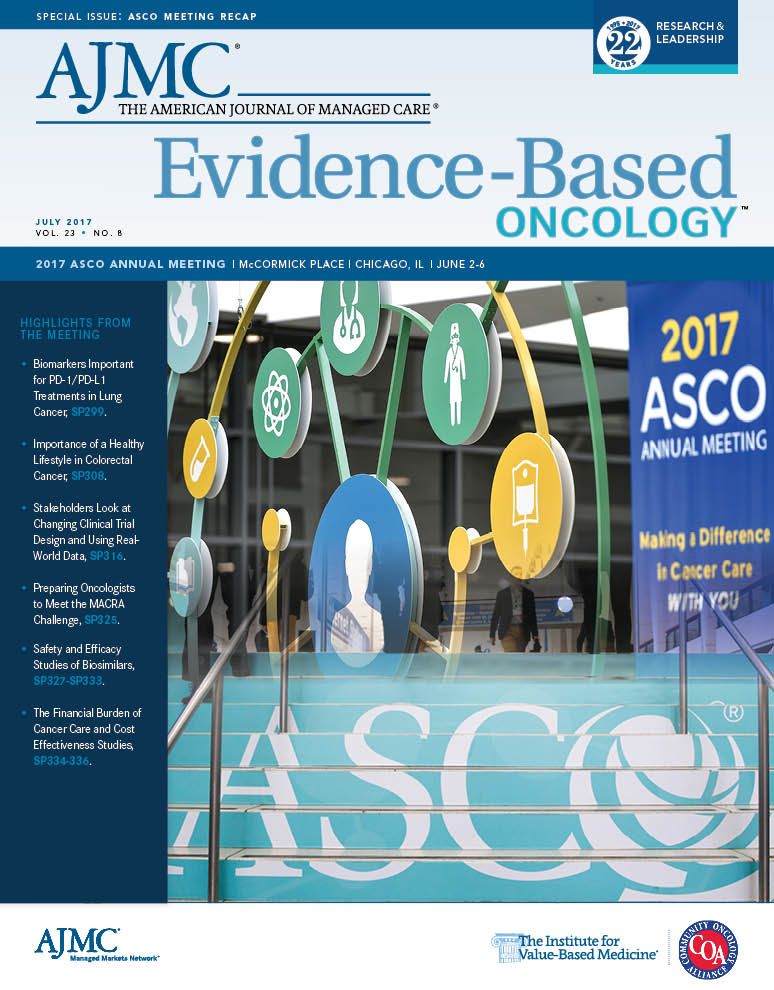- Center on Health Equity & Access
- Clinical
- Health Care Cost
- Health Care Delivery
- Insurance
- Policy
- Technology
- Value-Based Care
Research Demonstrates Efficacy and Safety of Trastuzumab Biosimilar SB3
Research presented at the 2017 American Society of Clinical Oncology Annual Meeting showed that SB3, a proposed biosimilar to trastuzumab, has comparable efficacy, safety, immunogenicity, and pharmacokinetics to the reference product based on the breast pathological complete response.
A STUDY PRESENTED AT
the 2017 American Society of Clinical Oncology Annual Meeting demonstrated that SB3, a proposed biosimilar to trastuzumab (TRZ), has comparable efficacy, safety, immunogenicity, and pharmacokinetics (PKs) to the reference product based on the breast pathological complete response (bpCR). The researchers defined the bpCR rate as the primary endpoint of the study, which comprised 403 patients per arm.
The phase 3, double-blind, randomized, parallel-group, multicenter study, sponsored by Samsung Bioepis, sought to demonstrate the comparable efficacy of SB3 (which has an identical primary amino acid sequence to TRZ) and TRZ in terms of bpCR when the products are used in neoadjuvant settings in women who have either epidermal growth factor receptor 2—positive early breast cancer or locally advanced breast cancer.
Patients who were 18 to 65 years of age and newly diagnosed with stage II to III primary breast cancer received either SB3 or the reference product for 8 treatment cycles, which were given concurrently with chemotherapy. The patients then underwent surgery and a subsequent 10 cycles of either SB3 or TRZ.
The study analyzed efficacy in a per-protocol set (PPS), comprising those who had completed neoadjuvant therapy and surgery without any prespecified major deviations from protocol, and also considered a full-analysis set to provide supportive data. Drawing upon several published TRZ studies as a guideline, the researchers set equivalence margins in the PPS at a 90% confidence interval (CI) of the ratio of bpCR rates for SB3 and TRZ, or a 95% CI of the difference between the bpCR rates for the 2 products. Secondary endpoints for the study included total pathologic complete response (tpCR), overall response rate (ORR), event-free survival, PK equivalence, immunogenicity, and safety.
The researchers found that, after adjusting results by hormone receptor status, disease stage, and region, the adjusted bpCR ratio for the PPS was 1.259 (90% CI, 1.112-1.426), a value that falls within the pre-defined margin of 0.785 to 1.546. The adjusted difference was 10.7% (95% CI, 4.13%-17.26%), with the lower margin contained within and the upper margin falling outside the predefined margin (—13% to 13%). The tpCR results were reflective of the bpCR findings, with an adjusted PPS ratio of 1.315 (90% CI, 1.137-1.520). Results for ORR also bore out bpCR results, with an adjusted ratio for the PPS at 1.055 (90% CI, 1.023-1.088).
Additionally, the study data demonstrate comparable safety between SB3 and TRZ, with neutropenia, alopecia, and nausea representing the most commonly reported adverse effects in both study arms. PK data demonstrated equivalent steady-state trough levels. Finally, immunogenicity was comparable between the 2 groups up to cycle 9 of treatment, with positive anti-drug antibody results reported for 3 patients in the group receiving SB3 and none in the group receiving TZB.
Although the report notes that complete safety and survival data will follow, the researchers concluded that SB3 and TZB had equivalent efficacy based on the ratio of bpCR rates and that SB3 was both well tolerated and comparable to TZB in safety, immunogenicity, and PKs.REFERENCE
Pivot XB, Bondarenko I, Dvorkin M, et al. A randomized, double-blind, phase III study comparing SB3 (trastuzumab biosimilar) with originator trastuzumab in patients treated by neoadjuvant therapy for HER2-positive early breast cancer. J Clin Oncol. 2017;35(suppl; abst 509).

Subjective and Objective Impacts of Ambulatory AI Scribes
January 8th 2026Although the vast majority of physicians using an artificial intelligence (AI) scribe perceived a reduction in documentation time, those with the most actual time savings had higher relative baseline levels of documentation time.
Read More

